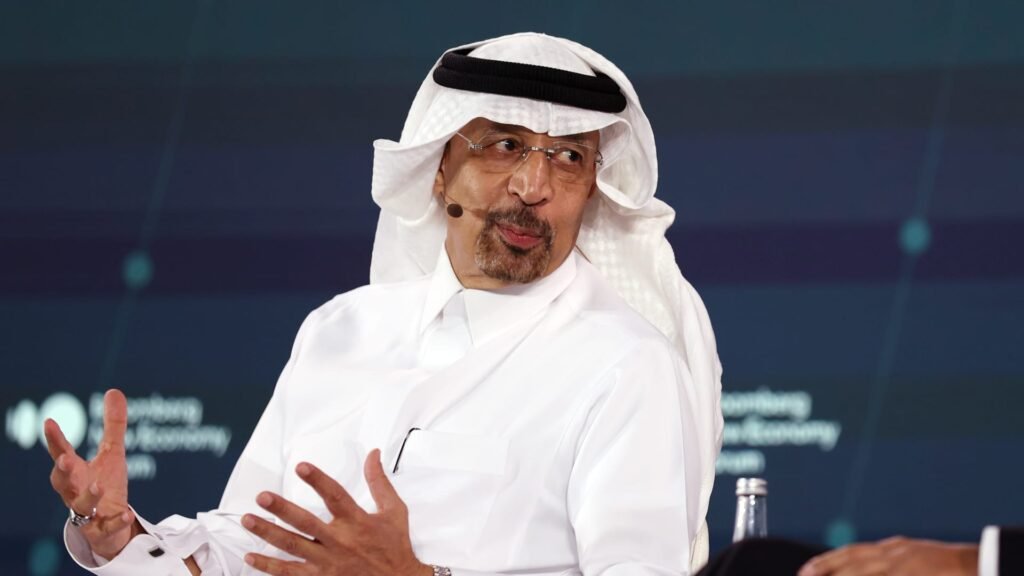Saudi Arabia’s Minister of Investment Khalid Al Falih during the Bloomberg New Economy Forum in Singapore, Wednesday, Nov. 8, 2023.
Bloomberg | Bloomberg | Getty Images
Saudi Arabia’s Investment Minister Khalid Al-Falih has hit back at skepticism about the country’s economic diversification plans as Riyadh touts “green shoring” investment opportunities to attract foreign funds.
“There were many who questioned the vision, the ambition, the breadth, the depth, the comprehensiveness and the development of a country like Saudi Arabia that has been dependent for decades on a commodity business like oil, and whether it could achieve what we are trying to achieve with Vision 2030,” Khalifa told CNBC’s Steve Sedgwick at the Ambrosetti Forum in Cernobbio, Italy, on Saturday.
Saudi Arabia, one of the Middle East’s largest economies and a key U.S. ally in the region, is stepping up investment to implement Crown Prince Mohammed bin Salman’s economic diversification plan, known as Vision 2030, which spans 14 megaprojects including the Neom Industrial Park.
Under the initiative, Riyadh aims to wean itself from its reliance on oil revenues, which the International Monetary Fund projects will rise until 2026 before declining, and attract more than $3 trillion in inflows into the economy, boosting foreign investment in the country to $100 billion a year by 2030.
A Saudi minister said on Saturday that eight years into Vision 2030, the country is now “more committed and more determined” to the plan and has already achieved or is close to achieving 87 percent of its goals. Critics of the plan had previously questioned whether Riyadh could meet its targets by the deadline.
In recent years, Saudi Arabia has sought to liberalize its markets and improve its business climate through reforms to its investment and labor laws, but it also instituted an unpopular requirement that companies set up regional headquarters in the Kingdom to win government contracts.
The IMF noted that the number of foreign investment licenses issued in Saudi Arabia is expected to nearly double in 2023, and government data showed that net foreign direct investment inflows rose 5.6 percent year-on-year in the first quarter.
However, concerns remain over potential uncertainty and unpredictability in the country’s legal framework and foreign investment dispute resolution system. Falih argued that Saudi Arabia prides itself on predictability and domestic political and economic stability.

“Green Shoring”
The Saudi investment minister said part of the services Riyadh is offering to foreign investors is its “green shoring” initiative, a term coined by the Kingdom to decarbonize supply chains in areas with renewable energy resources.
“Green shoring basically means we need to do more high-energy processing. [and] Increase added value in manufacturing in areas that require materials as well as energy [located]”Saudi Arabia has the logistics, capital and infrastructure to achieve this,” Falih said, adding that Saudi Arabia has the logistics, capital and infrastructure to achieve this.
Riyadh, the world’s top oil exporter, aims to achieve net-zero emissions by 2060 under its Vision 2030 plan. Along with neighboring United Arab Emirates (which will host the UN Climate Change Conference in 2023), Riyadh has been a high-profile presence at climate summits, but questions remain about its decarbonization efforts.
Riyadh, along with other members of the Organization of the Petroleum Exporting Countries (OPEC) oil alliance, has repeatedly called for the simultaneous use of hydrocarbons and green sources to avoid energy shortages during the global transition to net-zero emissions.
Some environmental activists criticize Saudi Arabia’s promotion of solutions such as carbon capture and storage (CCS) technology as a smokescreen to promote its lucrative oil business.
Al-Falih stressed that as part of “green shoring,” Saudi Arabia aims to “address the resilience of global supply chains” and “bring in copper, lithium, cobalt and other critical materials, rare earth metals, addressing semiconductor shortages, green fertilizers and green chemicals, while ensuring that we build a new, more electrified global economy.”



